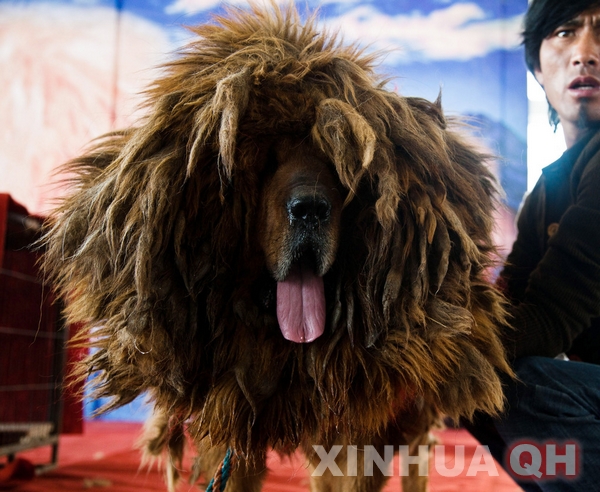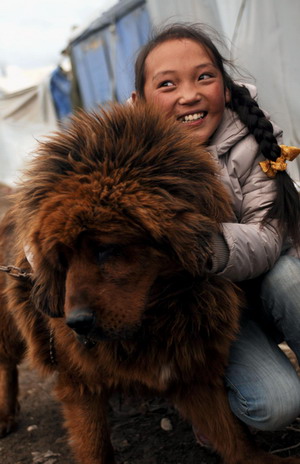
 |
|
A man with his mastiff at the?Tibetan mastiff exhibition in Xining, Qianghai province, April 29, 2012. [Photo / Xinhua] |
XINING - Kunga Tseten lost 18 Tibetan mastiffs, dogs he valued at more than $1 million, when a 7.1-magnitude earthquake hit Yushu two years ago, but he is confident of recovering the losses in a couple of years.
Kunga Tseten is using his backyard to raise nine mastiffs of different sizes, which are worth more than 1 million yuan ($159,000) in total.
"They are all the assets my family has got," he said while attending a three-day Tibetan mastiff exhibition in Xining, capital of northwest China's Qinghai province.
The event, the second of its kind, ends late on Tuesday after giving attendees the chance to discuss a rapidly developing source of trade and fortune.
|
 |
|
A girl plays with a mastiff in Yushu, Qinghai province, April 16, 2012. [Photo / Xinhua] |
Yushu is one of the country's major producing areas of Tibetan mastiffs besides Tibet's Tsomey and Nagchu.
Of the several hundred mastiff keepers travelling from across the country to the exhibition, two thirds are from Qinghai's Tibetan-inhabited areas.
Around 20,000 people from such areas have made profits from the mastiff breeding, Li said, explaining that some work on mastiff farms, some process feed and others engage in mastiff-related transportation and tourism.
"This lucrative industry is attracting even more people," he added.
The Tibetan mastiff industry burgeoned in the 1990s, when the "new riches" in coastal cities like Guangzhou came to regard owning one of the distinctive pets as a token of social status and wealth, thus stirring up a mastiff craze, said Li Quanli, vice president of the National Kennel Club of the China Animal Agriculture Association.
"Prices of Tibetan mastiffs have soared since 2000," he said. "An ordinary mastiff may be priced at more than 100,000 yuan and fine breeds at a minimum of one million yuan."
But a couple of years ago, money made from sales did not go entirely to breeders. A mastiff raiser named Nyima Tashi from Yushu recalled years ago a middleman might pay him 30,000 yuan for a dog before resell it in a prosperous city like Shenzhen for 100,000 yuan.
"Middlemen used to profiteer from reselling mastiffs, but not any longer," Li Jianhai said.
The kennel club vice president said, about 20,000 Tibetan mastiffs were sold outside Qinghai in 2011, with more than half sold directly to buyers by breeders or with the help of the province's Tibetan mastiff association.
"The transfer of gains from middlemen to herdsmen has been a major change in the province's mastiff industry in the past year or two," he said.
Kunga Tseten plans to keep breeding Tibetan mastiffs for a lifetime, and "sell every one of them at the highest possible price."
In the meantime, he hopes insurance companies will provide mastiff-related services to reduce the risks that canine diseases and deaths may bring to breeders.